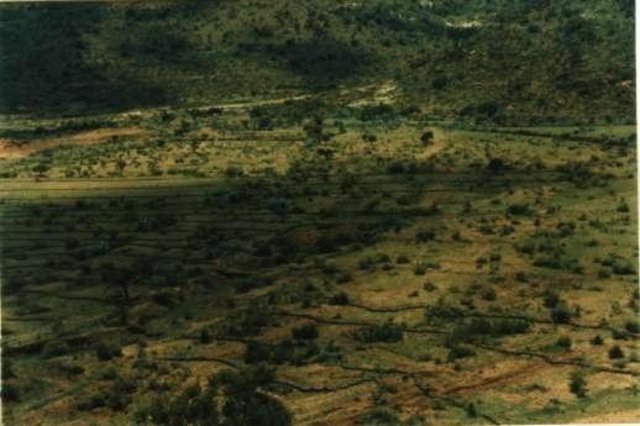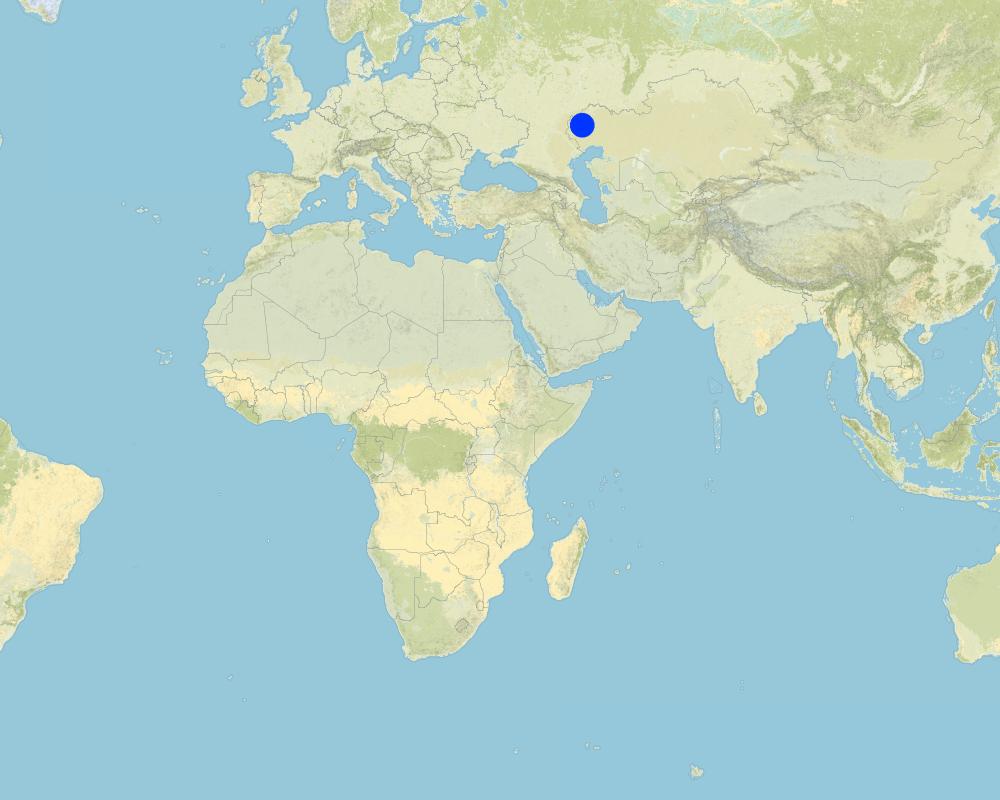Assistance to community [Afrique du Sud]
- Création :
- Mise à jour :
- Compilateur : Philippe Zahner
- Rédacteur : –
- Examinateur : Fabian Ottiger
approaches_2548 - Afrique du Sud
Voir les sections
Développer tout Réduire tout1. Informations générales
1.2 Coordonnées des personnes-ressources et des institutions impliquées dans l'évaluation et la documentation de l'Approche
Nom du ou des institutions qui ont facilité la documentation/ l'évaluation de l'Approche (si pertinent)
Swiss Agency for Development and Cooperation (DEZA / COSUDE / DDC / SDC) - Suisse1.3 Conditions relatives à l'utilisation par WOCAT des données documentées
Le compilateur et la(les) personne(s) ressource(s) acceptent les conditions relatives à l'utilisation par WOCAT des données documentées:
Oui
1.4 Références au(x) questionnaire(s) sur les Technologies de GDT

Old Motor Tyre Contours [Afrique du Sud]
Old motor tyres and/or vegetation along contours.
- Compilateur : Andrei Rozanov
2. Description de l'Approche de GDT
2.1 Courte description de l'Approche
Community requested assistance to combat soil erosion, only possible when 'Drought Relief Funds' became available.
2.2 Description détaillée de l'Approche
Description détaillée de l'Approche:
Aims / objectives: During the national drought of 1992, the Government made funds available for job creation to temporarily alleviate poverty in the rural areas. This community, with a population of approximately 4000, applied for funds, and suggested that the funds be used to combat soil erosion within their communal area of 3800 ha. The area was inspected by technicians from the then Lebowa Government: Directorate Agricultural Engineering, and a project site was identified where both proven high technology methods, as well as novel and unproven low technology biological methods, which can easily be adopted by relatively unskilled workers from the community, could be tried. Work started in 1992 with sufficient funds for six months. Fortunately, for the project, the national drought continued and funds were made available again during the subsequent three years for six monthly periods. No work has been done on the project since 1996 because of a lack of funds. In view of the visible improvement of the environment, the community is keen to expand the project to include more techniques to make the project more viable. The project has proved to be highly educational, not only to the local community, but also to all other communities who have visited the project. A prime example is that of the two communities from the Western Region who have adopted and adapted similar techniques at their own projects.
2.5 Pays/ région/ lieux où l'Approche a été appliquée
Pays:
Afrique du Sud
Région/ Etat/ Province:
Sekhukhuneland, Northern Province
Map
×2.6 Dates de début et de fin de l'Approche
Indiquez l'année de démarrage:
1992
2.7 Type d'Approche
- fondé sur un projet/ programme
2.8 Principaux objectifs de l'Approche
The Approach focused mainly on SLM with other activities (Job creation. Empower the community to practice conservation, increase production of their natural resources and to improve their quality of life. Improve biodiversity. Demonstration model for researcher & other communities.)
Rehabilitation of the environment by trapping run-off rain water to plant trees, grass and other vegetation to improve the general biodiversity.
The SLM Approach addressed the following problems: Soil degradation caused by water erosion as a result of over utilisation.
2.9 Conditions favorisant ou entravant la mise en œuvre de la(des) Technologie(s) appliquée(s) sous l'Approche
disponibilité/ accès aux ressources et services financiers
- entrave
government job creation funds
Treatment through the SLM Approach:
cadre juridique (régime foncier, droits d'utilisation des terres et de l'eau)
- favorise
The existing land ownership, land use rights / water rights helped a little the approach implementation: help and hinder low, n/a
connaissances sur la GDT, accès aux supports techniques
- entrave
department of agriculture
Treatment through the SLM Approach:
3. Participation et rôles des parties prenantes impliquées dans l'Approche
3.1 Parties prenantes impliquées dans l'Approche et rôles
- exploitants locaux des terres / communautés locales
existing groups of land users; Specific ethnic groups:: Only one group in area.; Working land users were work equally divided between men and women
Involvment of socially and economically disadvantaged groups: With discussion, the Phaahla Mohlaka tribe.
- gouvernement national (planificateurs, décideurs)
Department of Agriculture - Engineering Division.
Si plusieurs parties prenantes sont impliquées, indiquez l'organisme chef de file ou l'institution responsable:
University of the North, Department of Agriculture
3.2 Participation des exploitants locaux des terres/ communautés locales aux différentes phases de l'Approche
| Participation des exploitants locaux des terres/ communautés locales | Spécifiez qui était impliqué et décrivez les activités | |
|---|---|---|
| initiation/ motivation | interactive | Mainly:public meetings; partly: rapid/participatory rural appraisal; Community meeting never regularly, meeting as often as needed, on side participation. |
| planification | interactive | rapid/participatory rural appraisal; The specialists planned and discussed it with the people |
| mise en œuvre | interactive | Mainly: casual labour; partly: responsibility for major steps; The specialists planned and discussed it with the people |
| suivi/ évaluation | interactive | measurements/observations; Observation by technical staff, regularly reporting to the Department |
| Research | passive | on-farm; Continuous contact while working on the project. |
3.4 Prises de décision pour la sélection de la Technologie/ des Technologies
Indiquez qui a décidé de la sélection de la Technologie/ des Technologies à mettre en œuvre:
- principalement les spécialistes de la GDT, après consultation des exploitants des terres
Expliquez:
consultative. Suggestions are made by technical staff to the local community for ratification.
Decisions on the method of implementing the SLM Technology were made by mainly by SLM specialists with consultation of land users. consultative. Mutual discussion between technical staff and local community.
4. Soutien technique, renforcement des capacités et gestion des connaissances
4.1 Renforcement des capacités/ formation
Une formation a-t-elle été dispensée aux exploitants des terres/ autres parties prenantes?
Oui
Spécifiez qui a été formé:
- exploitants des terres
Formats de la formation:
- sur le tas
Thèmes abordés:
People were instructed how to do the job, but not real training.
4.2 Service de conseils
Les exploitants des terres ont-ils accès à un service de conseils?
Oui
Décrivez/ commentez:
Name of method used for advisory service: Government extension staff; Key elements: Range land management; 1) Advisory service was carried out through: Government's existing extension system 2) Advisory service was carried out through: Government's existing extension system; Extension staff: Mainly government employees
Advisory service is inadequate to ensure the continuation of land conservation activities; Too few officers adequately conversant with SWC.
4.3 Renforcement des institutions (développement organisationnel)
Des institutions ont elles été mises en place ou renforcées par le biais de l'Approche?
- non
4.4 Suivi et évaluation
Le suivi et l'évaluation font ils partie de l'Approche? :
Oui
Commentaires:
bio-physical aspects were ad hoc monitored through observations
technical aspects were regular monitored through observations
There were several changes in the Approach as a result of monitoring and evaluation: 1) Grass growing where there were none. 2) Numbers of grass species have increased considerably. 3) Gullies are stabilizing. 4) Water run off reduced.
4.5 Recherche
La recherche a-t-elle fait partie intégrante de l’Approche?
Oui
Spécifiez les thèmes:
- technologie
Donnez plus de détails et indiquez qui a mené ces recherches:
Determine sediment deposit and erosion control of the techniques.
Research was carried out on-farm
5. Financement et soutien matériel externe
5.1 Budget annuel de la composante GDT de l'Approche
Si le budget annuel précis n'est pas connu, indiquez une fourchette:
- 10 000-100 000
Commentez (par ex. principales sources de financement/ principaux bailleurs de fonds):
Approach costs were met by the following donors: government (national - Government Drought Relief): 100.0%
5.2 Soutiens financiers/ matériels fournis aux exploitants des terres
Les exploitants des terres ont-ils reçu un soutien financier/ matériel pour la mise en œuvre de la Technologie/ des Technologies?
Oui
Si oui, spécifiez le(s) type(s) de soutien, les conditions et les fournisseurs:
A daily wage is paid by means drought relief job creation.
5.3 Subventions pour des intrants spécifiques (incluant la main d'œuvre)
Commentaires:
A daily wage is paid by means drought relief job creation.
5.4 Crédits
Des crédits ont-ils été alloués à travers l'Approche pour les activités de GDT?
Non
6. Analyses d'impact et conclusions
6.1 Impacts de l'Approche
Est-ce que l'Approche a aidé les exploitants des terres à mettre en œuvre et entretenir les Technologies de GDT?
- Non
- Oui, un peu
- Oui, modérément
- Oui, beaucoup
Est-ce que l'Approche a amélioré les questions foncières et des droits d'utilisation qui entravent la mise en œuvre des Technologies?
- Non
- Oui, un peu
- Oui, modérément
- Oui, beaucoup
The problem is unlikely to be overcome in the near future. Because of no individual ownership
Did other land users / projects adopt the Approach?
- Non
- Oui, un peu
- Oui, modérément
- Oui, beaucoup
Too early to comment.
6.3 Durabilité des activités de l'Approche
Les exploitants des terres peuvent-ils poursuivre ce qui a été mis en œuvre par le biais de l'Approche (sans soutien extérieur)?
- non
Si non ou incertain, spécifiez et commentez:
It is a social problem, cause in human nature.
6.4 Points forts/ avantages de l'Approche
| Points forts/ avantages/ possibilités du point de vue de l'exploitant des terres |
|---|
| improvement of the general economic situation (How to sustain/ enhance this strength: Expanding it) |
| increase job creation (How to sustain/ enhance this strength: But only for a short time) |
| Points forts/ avantages/ possibilités du point de vue du compilateur ou d'une autre personne ressource clé |
|---|
| At the beginning the workers regarded the work mainly as a source of income (How to sustain/ enhance this strength: Lack of understanding. After some rain had fallen that they came to realise what was being accomplished, and their enthusiasm grew steadily from that time.) |
| increase job creation (How to sustain/ enhance this strength: But only for a short time) |
| improvement of the general economic (How to sustain/ enhance this strength: Expanding it) |
6.5 Faiblesses/ inconvénients de l'Approche et moyens de les surmonter
| Faiblesses/ inconvénients/ risques du point de vue de l’exploitant des terres | Comment peuvent-ils être surmontés? |
|---|---|
| lack of funds | |
| no individual benefits for the local |
| Faiblesses/ inconvénients/ risques du point de vue du compilateur ou d'une autre personne ressource clé | Comment peuvent-ils être surmontés? |
|---|---|
| no individual benefits for the local | Land tenure |
| lack of funds | Find more funds |
7. Références et liens
7.1 Méthodes/ sources d'information
- visites de terrain, enquêtes sur le terrain
- interviews/entretiens avec les exploitants des terres
7.2 Références des publications disponibles
Titre, auteur, année, ISBN:
Preliminary Report Geen Einde.Request for funding.Geen Einde - Trees planted so far.
Disponible à partir d'où? Coût?
C.W. SpiesC.W. SpiesC.W. Spies
Liens et modules
Développer tout Réduire toutLiens

Old Motor Tyre Contours [Afrique du Sud]
Old motor tyres and/or vegetation along contours.
- Compilateur : Andrei Rozanov
Modules
Aucun module trouvé


